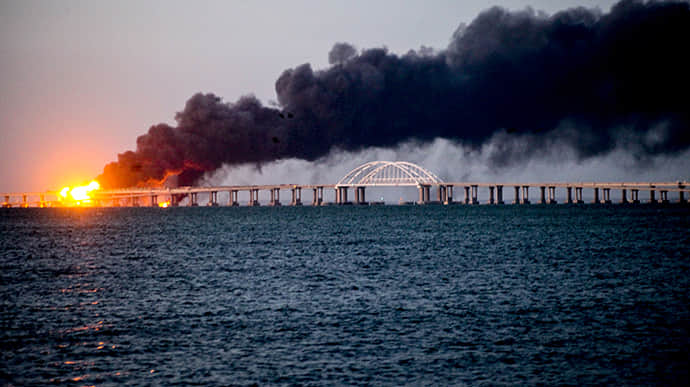Russia set to build underwater tunnel between Crimea and Russia with China's help – WP

Russian and Chinese businessmen with government ties secretly discussed plans in October to build an underwater tunnel connecting Russia with occupied Ukraine's Crimea and formed a "consortium" for this purpose, as reported by The Washington Post (WP). Source: The Washington Post, citing intercepted emails provided to the newspaper by unnamed Ukrainian officials Details: The newspaper says it has verified the authenticity of the messages, referring to company registration documents indicating that a Russo-Chinese consortium involving the individuals mentioned in the emails has been recently established in Crimea.
Advertisement:Quote: "The talks, which included meetings in late October, were triggered by mounting Russian concerns over the security of an 11-mile bridge across the Kerch Strait."
More details: Emails circulated among consortium officials over recent weeks referred to gatherings with Chinese delegates in Crimea. The Chinese Railway Construction Corporation (CRCC) is described in one of them, dated 4 October, as "ready to ensure the construction of railway and road construction projects of any complexity in the Crimean region". For reference: The CRCC is a state-owned company that has built many of China's most significant road and rail networks and has developed extensive ties with Russia in recent years through projects, including the expansion of the Moscow metro system completed in 2021.
The company failed to respond to requests for comment. Even more details: The head of the Russo-Chinese consortium based in the city of Sevastopol (Russian-occupied Crimea) refused to speak to the newspaper when asked about the tunnel project. Vladimir Kalyuzhny, a Russian businessman listed as the consortium's CEO, rejected the question, then claimed that he would not provide any information to "hostile media" and abruptly ended the conversation.
His response contradicted how the proposal appeared in internal emails. In a message sent last month to a Russian official who is one of Crimea's main representatives in Moscow, Kalyuzhny said he had "a letter from our Chinese partners about the readiness of one of the largest companies in China, CRCC, to participate as a general contractor in the construction of a tunnel under the Kerch Strait". The email in question went to Georgiy Muradov, who was identified as the Permanent Representative of the Republic of Crimea to Russian President Vladimir Putin.
Muradov did not respond to a comment request. Six of the nine founding directors of the consortium are not listed in the registration files. The emails also demonstrate China's efforts to maintain secrecy.
One of the emails highlights that CRCC would only participate under the condition of "strict provision of complete confidentiality" and that the company's name would be replaced with "another, unaffiliated legal entity" in any contracts. Another email mentions a Chinese bank ready to "convert its dollar funds into rubles for their transfer to Crimea to fund [consortium - WP] projects". The emails also cite discussions between the consortium and a CRCC executive identified as Xu Huaxiang.
This name matches a Chinese national listed as vice president and deputy general manager of the company's international division. Attempts to contact Huaxiang were unavailing. "Given the risks of sanctions and sabotage, US officials and experts expressed surprise that CRCC would risk involvement," the WP reported.
Experts on major international transport projects suggest that it is technically feasible to construct a tunnel under the Kerch Strait and that China has the necessary experience and technology. However, they say it will be a considerable undertaking, comparable in scale to the Denmark-Germany tunnel, which has been under construction for eight years, is estimated to cost over US£8.7 billion and will be the longest in Europe when it is completed at the end of the decade. Experts doubt that the Kerch tunnel will be completed in time to help Russia in its military efforts.
Still, Moscow may see it as a long-term investment to ensure safe communication with Ukrainian territory that could be disputed for decades.
Support UP or become our patron!